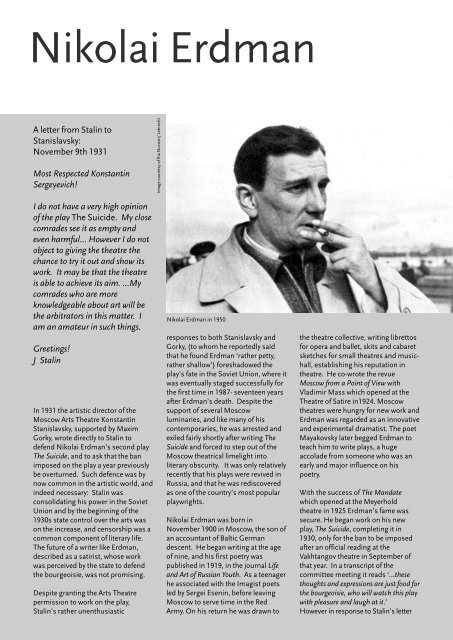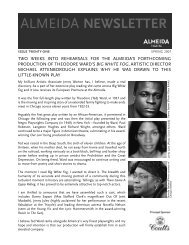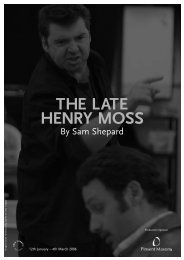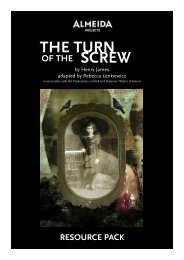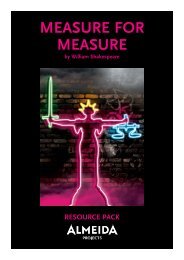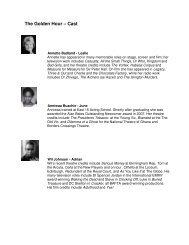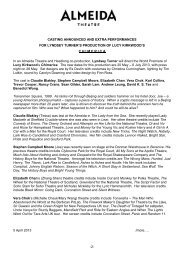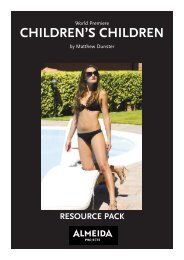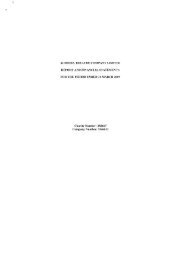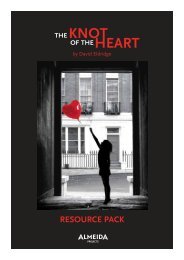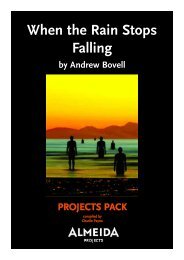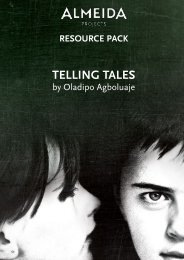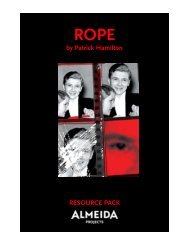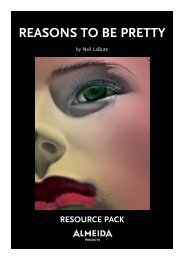DYING FOR IT - Almeida Theatre
DYING FOR IT - Almeida Theatre
DYING FOR IT - Almeida Theatre
You also want an ePaper? Increase the reach of your titles
YUMPU automatically turns print PDFs into web optimized ePapers that Google loves.
Nikolai Erdman<br />
A letter from Stalin to<br />
Stanislavsky:<br />
November 9th 1931<br />
Most Respected Konstantin<br />
Sergeyevich!<br />
Image courtesy of Ria Novosti/ Lebrecht<br />
I do not have a very high opinion<br />
of the play The Suicide. My close<br />
comrades see it as empty and<br />
even harmful… However I do not<br />
object to giving the theatre the<br />
chance to try it out and show its<br />
work. It may be that the theatre<br />
is able to achieve its aim. …My<br />
comrades who are more<br />
knowledgeable about art will be<br />
the arbitrators in this matter. I<br />
am an amateur in such things.<br />
Greetings!<br />
J Stalin<br />
In 1931 the artistic director of the<br />
Moscow Arts <strong>Theatre</strong> Konstantin<br />
Stanislavsky, supported by Maxim<br />
Gorky, wrote directly to Stalin to<br />
defend Nikolai Erdman’s second play<br />
The Suicide, and to ask that the ban<br />
imposed on the play a year previously<br />
be overturned. Such defence was by<br />
now common in the artistic world, and<br />
indeed necessary: Stalin was<br />
consolidating his power in the Soviet<br />
Union and by the beginning of the<br />
1930s state control over the arts was<br />
on the increase, and censorship was a<br />
common component of literary life.<br />
The future of a writer like Erdman,<br />
described as a satirist, whose work<br />
was perceived by the state to defend<br />
the bourgeoisie, was not promising.<br />
Despite granting the Arts <strong>Theatre</strong><br />
permission to work on the play,<br />
Stalin’s rather unenthusiastic<br />
Nikolai Erdman in 1950<br />
responses to both Stanislavsky and<br />
Gorky, (to whom he reportedly said<br />
that he found Erdman ‘rather petty,<br />
rather shallow’) foreshadowed the<br />
play’s fate in the Soviet Union, where it<br />
was eventually staged successfully for<br />
the first time in 1987- seventeen years<br />
after Erdman’s death. Despite the<br />
support of several Moscow<br />
luminaries, and like many of his<br />
contemporaries, he was arrested and<br />
exiled fairly shortly after writing The<br />
Suicide and forced to step out of the<br />
Moscow theatrical limelight into<br />
literary obscurity. It was only relatively<br />
recently that his plays were revived in<br />
Russia, and that he was rediscovered<br />
as one of the country’s most popular<br />
playwrights.<br />
Nikolai Erdman was born in<br />
November 1900 in Moscow, the son of<br />
an accountant of Baltic German<br />
descent. He began writing at the age<br />
of nine, and his first poetry was<br />
published in 1919, in the journal Life<br />
and Art of Russian Youth. As a teenager<br />
he associated with the Imagist poets<br />
led by Sergei Esenin, before leaving<br />
Moscow to serve time in the Red<br />
Army. On his return he was drawn to<br />
the theatre collective, writing librettos<br />
for opera and ballet, skits and cabaret<br />
sketches for small theatres and musichall,<br />
establishing his reputation in<br />
theatre. He co-wrote the revue<br />
Moscow from a Point of View with<br />
Vladimir Mass which opened at the<br />
<strong>Theatre</strong> of Satire in1924. Moscow<br />
theatres were hungry for new work and<br />
Erdman was regarded as an innovative<br />
and experimental dramatist. The poet<br />
Mayakovsky later begged Erdman to<br />
teach him to write plays, a huge<br />
accolade from someone who was an<br />
early and major influence on his<br />
poetry.<br />
With the success of The Mandate<br />
which opened at the Meyerhold<br />
theatre in 1925 Erdman’s fame was<br />
secure. He began work on his new<br />
play, The Suicide, completing it in<br />
1930, only for the ban to be imposed<br />
after an official reading at the<br />
Vakhtangov theatre in September of<br />
that year. In a transcript of the<br />
committee meeting it reads ‘…these<br />
thoughts and expressions are just food for<br />
the bourgeoisie, who will watch this play<br />
with pleasure and laugh at it.’<br />
However in response to Stalin’s letter


